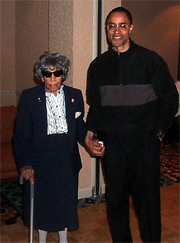 |
Ethel Johnson and Walter Brooks in 2002. |
My eldercare person is Ethel Lee Johnson, 93. I have lived with her since 1977. Ethel has an immune-related skin disorder called “cicatricial pemphigoid.” Diagnosed in 1988, it’s a systemic inflammation of the whole body characterized by generalized spontaneous water blistering of the skin and horrendous itching episodes (she once described it as “lit matches crawling under my skin.”) The damaged skin ultimately deteriorated to wound care in some areas. She also developed thick scar tissue over both corneas that resulted in total blindness by 1997.
Eldercare is not for the faint of heart — especially if you don’t have a lot of backup. For all intent and purposes, I have taken care of Ethel by myself as full-time care giver since September 1993. A lot of experts talk about respite needs and life balance and I don’t argue with any of it. Only, none of those experts are in my house at 3 a.m. when she’s only calling my name.
Ethel took a fall in December 1998 and did 10 weeks in nursing home rehab. That experience almost killed her. The dejection and depression at being “put away” had her “dying” by week five. She completely shut down. It took more than I can tell to keep her spirits up enough to get her back home five weeks later.
She’s been back home since March 1999, with home nursing aides in the house from 8 a.m. to 6 p.m. daily, while I work. I get a respite nurse aide every Saturday from noon to 6 p.m. Other wise, it’s just me and Ethel. I prepare all her meals. Home aides will fix breakfast and then serve prepared lunches. (Veteran aides know how to put a lunch together with leftovers, but less experienced aides need everything laid out in advance.)
Ethel also needs hand-feeding for most meals. The home health agency doesn’t allow the aides to walk her outside the house, up and down stairs or give her full baths, for example, because of her debilitated condition. Yet, I still do that regularly because I know she needs to feel alive and not just vegetate in a chair all day.
Last year Ethel was under hospice care for six months because of declining health including the opening of an old wound and dropping from 118 pounds to 88 pounds. I still do all the bandage work and now the kitchen is open 24 hours a day. I’ve given her whole meals at 3 a.m. because it was the first time she would eat something in 15 to 18 hours or more. So, it’s nothing to wake up two to five times for a toilet call, hunger, and pain/discomfort or dementia episodes.
Eldercare is more than just dressing, bathing and feeding. You’re all that stands between somebody and the grave. The weight can be heavy. But when you pledge to keep your loved one in the home, you have to be prepared for the long haul. Ultimately, your only true respite is their death and that is what you’re trying so hard to forestall. Every day that I wake up and Ethel is still here is a victory. And for all her health issues, I still have the joy of her company and memories of 27 years of a great friendship.
All of us eldercare givers have to work it out in our own way. I am glad that I have been able to live with mine and be there 24-7. It’s hard duty but it’s love duty. And with some neighborly and social services assistance, we’ll just keep on pushing.